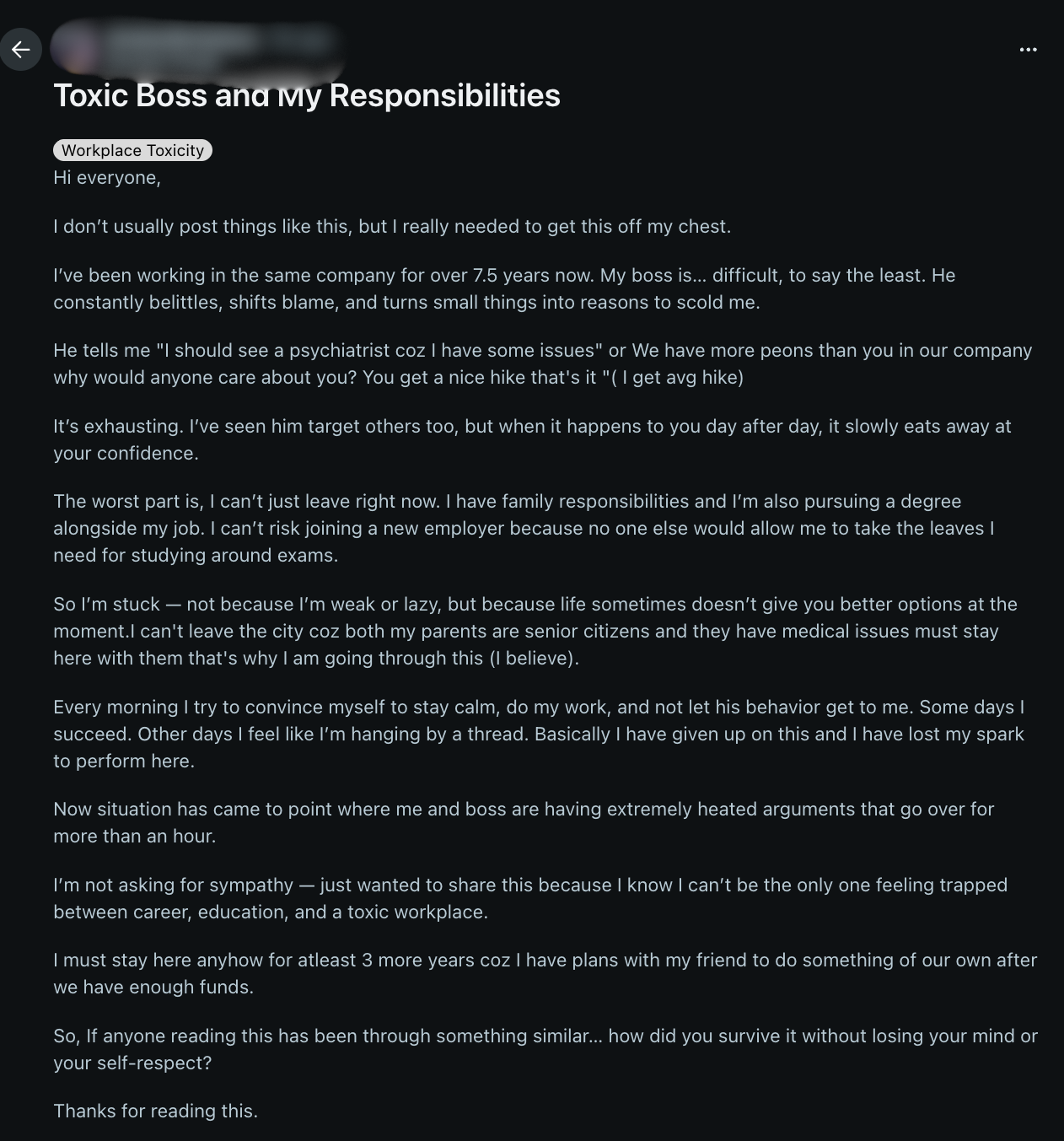ARTICLE AD BOX

India’s workforce and toxic jobs; why quitting isn’t an option
For many professionals, a toxic boss is just another reason to update their résumé, send applications, and move on. But for a growing segment of India’s workforce, walking away isn’t an option — not when financial stability, family responsibility, and future aspirations are tightly bound to the job they currently hold.A recent viral post on Reddit brought this struggle into sharp focus. In an honest, vulnerable message posted under a community thread on workplace toxicity, a mid-career employee shared how years of emotional harassment from his manager have slowly eroded his confidence, yet circumstances force him to stay right where the damage is happening.“I’ve been working in the same company for over 7.5 years now. My boss constantly belittles me, shifts blame, and turns small things into reasons to scold me. He tells me I should see a psychiatrist because I have issues, and asks why anyone would care about me when there are peons who are more useful.”His words reflect a pattern many employees silently endure: daily criticism that blurs the line between professional accountability and personal attack. The difference? This employee cannot leave — at least not yet.

Why many stay even when work becomes harmful
On the surface, career mobility in India appears stronger than ever.
Hiring rebounds every few months, gig work and remote options have expanded, and LinkedIn is full of posts encouraging people to “stop tolerating toxic workplaces.”But the lived reality is complicated.The Reddit user’s situation highlights structural constraints:
- Family dependency: His senior citizen parents require medical support, making relocation impossible
- Education in progress: He is pursuing a degree and needs exam-related leave most employers wouldn’t grant
- Financial limits: Savings are being directed towards a future entrepreneurial plan; moving jobs feels risky
Quitting isn’t always courage — and staying isn’t always helplessness. Sometimes, responsibility wins over self-preservation.Many employees don’t remain in toxic workplaces due to a lack of ambition or alternatives.
They stay because circumstances outside the office including family care, financial commitments, academic goals make job changes risky. When stability becomes essential to survival, enduring mistreatment can feel like the only option left.
A slow, quiet erosion of the self
Toxic managers often deny wrongdoing by claiming it’s just “pressure” or “direct feedback.” But when critique shifts into personal insult, especially repeated over years, the impact is severe.The employee describes days where he feels strong and composed… and others where he feels he is “hanging by a thread.” He also admits he has “lost the spark to perform,” a textbook sign of emotional burnout.According to a 2024 study by Deloitte, 57% of Indian employees cite workplace behaviour from managers as their primary cause of stress. The longer such conditions persist, the deeper the damage:
- Falling confidence
- Difficulty in decision-making
- Emotional detachment from work
- Mental exhaustion that spills into personal life
The Reddit post reveals that arguments with the manager can stretch over an hour, turning work performance discussions into psychological battles.Yet despite the emotional weight, employees like him show an incredible — though often unnoticed — resilience. They show up. They continue to deliver. They continue to care about a better future.
The psychological trap: “I can’t leave”
One of the most painful aspects of dealing with workplace toxicity is the loss of agency. Even if the employee knows they deserve better, practical limitations act like a cage.The individual writes, “I’m not stuck because I’m weak. I’m stuck because life sometimes doesn’t give better options at the moment.”This theme resonates strongly with mid-career professionals who are:
- The sole caregivers in their family
- First-generation degree seekers funding their education through work
- Long-term employees whose financial obligations increase over time
India’s workforce has evolved rapidly, but the support systems around them have not kept pace. A single toxic manager can jeopardise not just professional growth but the entire structure of a person’s life — especially when their financial security, caregiving duties, and future aspirations are tied closely to one job. The burden is not only professional; it becomes deeply emotional and social as well.
The hidden crisis in India’s employment landscape
While companies champion wellness initiatives, mentorship, and leadership training, the lived experiences of employees expose gaps between policies and culture.Three broader factors are contributing to silent suffering:
- Urban immobility: Many workers must stay close to family for caregiving needs
- Limited employer flexibility: Especially regarding exam leaves or upskilling
- Power imbalance: Long-tenured employees feel they must tolerate bad behaviour to protect job security
Despite new-age HR models encouraging open communication, many employees fear retaliation more than relief. “Speaking up” can backfire, especially when the toxic boss has organisational influence.The result: Mental health deteriorates quietly while employees remain outwardly compliant.
Breaking the silence
If anything, this viral account is a window into a larger, unspoken reality. For every person who posts online about workplace toxicity, thousands never will. They keep telling themselves to endure. To be grateful. To not make things worse.But speaking about it, even anonymously, is a first step toward reclaiming self-worth.This worker isn’t the only one trapped between career, caregiving, and higher education. But his voice ensures that people like him are no longer alone in that silence.And perhaps someday, his story will end not in burnout — but in a workplace where dignity isn’t a privilege, but a baseline expectation.

 15 hours ago
3
15 hours ago
3







 English (US) ·
English (US) ·